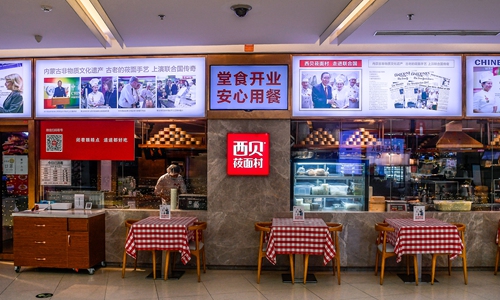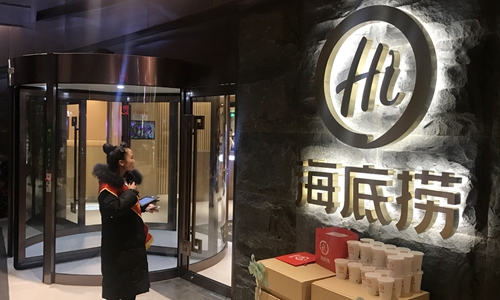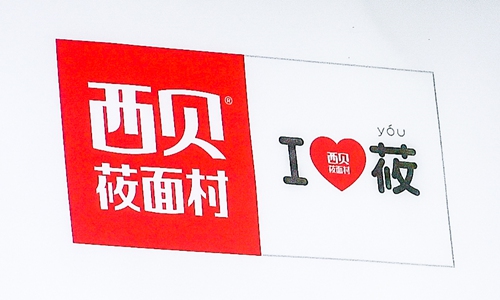Chinese chain restaurant Xibei apologizes for price hike after Haidilao
Source:Global Times Published: 2020/4/11 18:23:46

Chinese chain restaurant Xibei. Photo: IC
Chinese chain restaurant Xibei, which was exposed to having raised menu prices amid the COVID-19 pandemic, apologized and lowered prices back to pre-pandemic levels after the move sparked heated discussion among consumers.
The food chain which specializes in delicacies from Northwestern China, has increased prices on 18 takeaway dishes in Shanghai and eight surrounding cities by 1-10 yuan ($0.14-$1.4) since February 1. The firm has also raised the dine-in prices of 25 dishes in 12 stores in Shanghai by 1-10 yuan starting from April 6, Jia Guolong, chairman of Xibei Catering Group, said in a post on China's twitter-like Sina Weibo on Saturday.
Jia apologized for the price increases, noting that the move is not suitable at the moment. "We are also in a quite difficult period, and hope customers can support our businesses," Jia said.

Hotpot restaurant Haidilao. Photo: IC
Hotpot restaurant Haidilao, which raised menu prices after resuming dine-in services, also apologized in a statement on Friday. Haidilao told the Global Times on Saturday that raising menu prices was a "wrong decision made by the management team," which impedes the interests of customers and the firm is "deeply sorry" for that.
Both Xibei and Haidilao said menu prices will return to standard levels before January 26.
The apologies came amid a multitude of restaurants allegedly raising menu prices following the resumption of dine-in services in China, in an attempt to offset rising food costs and economic losses from forced closures due to the coronavirus.
In the first two months of 2020, the catering industry recorded a total revenue of 419.4 billion yuan, a year-on-year decrease of 43.1 percent, according to the National Bureau of Statistics.
Moreover, though more restaurants are resuming dine-in services as the pandemic has abated in the country, most still adopt quite strict anti-pandemic measures -such as asking consumers to sit separately while eating, frequent disinfection, and temperature screening to prevent viral transmission-further adding to operating costs.
"I've waited for 50 minutes for a table for four - partly because customers are asked to sit separately while eating due to the pandemic," a Beijing-based resident surnamed Chen who visited a Haidilao restaurant in Chaoyang District, Beijing, told the Global Times on Saturday.
Chen said it's also becoming "much more complicated" to get into the restaurant due a strict health check process - people without 'green' health codes, which trace travel history in the past 14 days, are denied entry. Besides, for every customer, body temperature screening and disinfection is mandatory.
A Global Times reporter also recently visited the Joy City in Chaoyang district, one of the many bustling shopping malls in Beijing, and found major restaurants have reopened. During rush hour, consumers were seen waiting outside for a table, like usual and the waiting time has been prolonged as most restaurants require people not to sit next to each other.

Photo: IC
The comprehensive anti-pandemic measures adopted by Chinese restaurants, which were proved to be an effective way to reassure and encourage consumers to dine in as the pandemic still casts a shadow on people's daily lives, should also be considered by restaurants in foreign countries, analysts said.
Industry analysts also noted that given that the profits of catering industries can reach 70 percent, leading companies should make joint efforts to tide over the difficult period rather than transferring costs to the customers in pursuit of profits.
The apologies made by Haidilao and Xibei, which have sparked heated discussion online, are more like a free advertisement to attract consumers, as it tells everyone that "dine-in services restart, come to eat," Zhu Hang, an industry analyst told the Global Times on Saturday.
Posted in: SOCIETY